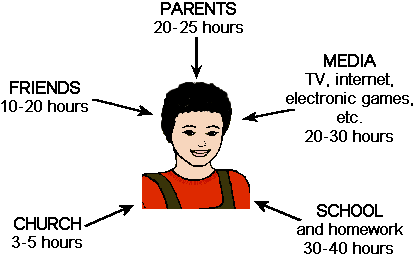

PRINCIPLE 17 |
God has established three human agencies: the family, the church, and civil government. Each agency has its own special purpose, yet all three are interrelated. In this chapter we are concerned mainly with the family.
There are many reasons why families are important, but for now we will focus on just one reason -- the ministry of the Christian family to its children.
A school age child or teen is influenced from many sides during a typical week of his life. Each influence has its own unique impact in shaping the character and future of the individual. The numbers on the following diagram would vary greatly depending on the age of the child and the particular weekly pattern of the family.

Parents must realize that their share of influence on their children, even though it begins at nearly 100 percent when the child is an infant, decreases year after year until the young adult leaves the family and the parents have relatively little influence left. During most of the child's years, the parents are only one of several very strong influences. The challenge for parents is obvious. They must make the most of the time they have to influence their children and teens. They, not the church or some other Christian organization, are primarily responsible to evangelize their children and nurture them in the Lord (Deuteronomy 6:6-7; Ephesians 6:1-4). But fulfilling this responsibility does not come easily. Commitment, prayer, planning, and hard work are required.
A Christian committed to Jesus Christ as Lord is also committed to the Bible as the Word of God. In turn, these commitments lead to something further -- commitments to people -- and here is where we face a problem. We cannot be equally committed to everyone. Commitment requires a selection, a setting aside of many good concerns in order to devote ourselves to a few concerns. Of course, we are concerned about many people: the lost, maturing believers, neighbors, relatives and our immediate family. All of these concerns are good, but they raise many dilemmas. Should we attend the extra committee meeting or take that promised bike ride with our daughter? Should we join the evangelistic survey this afternoon or help our neighbor move his piano? Should we write a letter to an old friend tonight or talk with our wife or husband? At different times we should do all of these things, but at any given moment we must choose between one activity and another, that is, between one person and another.
When a choice must be made between our family and others, our family should come first. The reasons are, first, a commitment to our family already exists. Marriage, rather than being the basis for a commitment, is a commitment. Even though as an adult we still have some obligations to our parents, our "family of birth" (1 Timothy 5:4), our commitment to our partner forms a "family of choice" which requires that we leave our parents in order to cleave to our partner (Genesis 2:24). We have already made a commitment to our family.
Second, we are called to our family just as much as we are called to Christian work. God calls us not merely to a certain full-time vocation or a certain location, but also to our family. The decision to marry and have children is no less a call and a responsibility than the decision to enter a particular ministry to move to a particular location. We are shortsighted if we quote Acts 20:32 and then skip off to our "calling."
Third, success with our family is one of God's requirements for leadership in the church or in a Christian organization.
If anyone does not know how to manage his own family, how can he take care of God's church? (1 Timothy 3:5; see also Titus 1:6)
Our family is our proving ground. If we neglect our family, we have sabotaged our other ministries.
Fourth, as parents we are more than providers. Provision for our family is important (1 Timothy 5:8), but much more is needed. We have not fulfilled our commitment to our family when we have merely paid for their shelter, food, clothing, insurance, and weekly allowance. Our example and instructions, which require our presence, are indispensable (Ephesians 6:4).
Fifth, Christian agencies cannot take our place as parents. The church, Christian school, or Christian organization can supplement the ministry of our home but cannot replace it. Besides, the family is still the best setting for building character and purpose into our children's lives, as both Christian and non-Christian psychologists and educators recognize. A strong home contributes to both a strong church and a strong nation (Ephesians 6:1-3).
We must not take our family for granted. As a minimum, each week we should do something with our family as a whole, and something with each member of our family individually. We will frequently have to say "no" to others, but such choices are part of our commitment to our family.